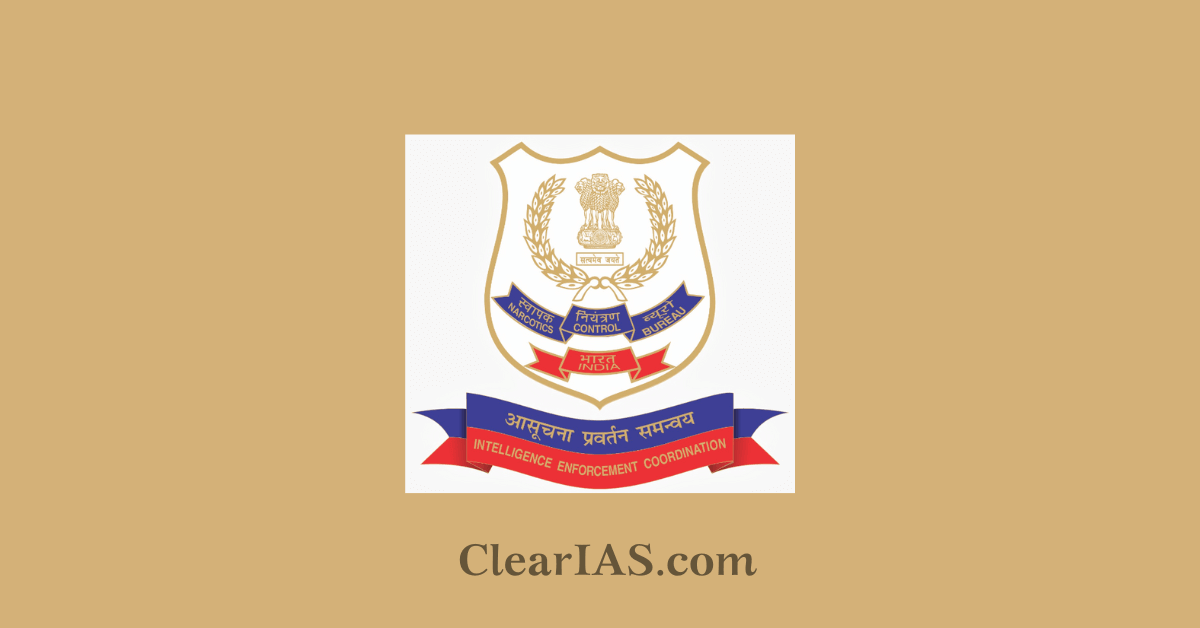
Narcotics Control Bureau (NCB) is a law enforcement agency for curbing drug and illegal substance usage in India. Read here to know more about the agency.
Narcotics Control Bureau is the drug law enforcement and intelligence agency of India responsible for fighting drug trafficking and the abuse of illegal substances.
The Narcotics Control Bureau’s national headquarters is located in Delhi.
It is affiliated with the Ministry of Home Affairs, which was made responsible for administering the Narcotic Drugs and Psychotropic Substances (NDPS) Act, 1985.
The National Policy on Narcotic Drugs and Psychotropic Substances is based on the Directive Principles, contained in Article 47 of the Indian Constitution, which direct the State to endeavor to bring about prohibition of the consumption, except for medicinal purposes, of intoxicating drugs injurious to health.
The government’s policy on the subject which flows from this constitutional provision is also guided by the international conventions on the subject. India is a signatory to:
- Single Convention on Narcotic Drugs 1961 which was amended by the 1972 Protocol to the Conventions on Psychotropic Substances, 1971
- United Nations Convention against Illicit Traffic in Narcotic Drugs and Psychotropic Substances, 1988.
The broad legislative policy of NCB is contained in the three Central Acts:
- Drugs and Cosmetics Act, 1940
- The Narcotic Drugs and Psychotropic Substances Act, 1985
- The Prevention of Illicit Traffic in Narcotic Drugs and Psychotropic Substances Act, 1988.
The responsibility of drug abuse control, which is a central function, is carried out through several Ministries, Departments, and Organisations.
These include the Ministry of Finance, the Department of Revenue which has the nodal coordination role as administrator of the NDPSAct, 1985, and the Prevention of Illicit Traffic in Narcotic Drugs and Psychotropic Substances Act, 1988.
History of Narcotics Control Bureau
The Narcotic Drugs and Psychotropic Substances Act, 1985 which came into effect on the 14th of November 1985 made an express provision for constituting a Central Authority to exercise the powers and functions of the Central Government under the Act.
In presence of this provision, the Government of India constituted the Narcotics Control Bureau on the 17th of March, 1986.
The Narcotics Control Bureau is the apex coordinating agency. It also functions as an enforcement agency through its zones and sub-zones.
- Zones are located in Ahmedabad, Bengaluru, Chandigarh, Chennai, Delhi, Guwahati, Indore, Jammu, Jodhpur, Kolkata, Lucknow, Mumbai, and Patna.
- Sub-zones are located at Ajmer, Amritsar, Bhubaneswar, Dehradun, Goa, Hyderabad, Imphal, Mandsaur, Madurai, Mandi, Raipur, Ranchi, and Kochi.
The zones and sub-zones collect and analyze data related to seizures of narcotic drugs and psychotropic substances, study trends, and modus operandi, collect and disseminate intelligence, and work in close cooperation with the Customs, State Police, and other law enforcement agencies like CBI.
Functions of NCB
The Bureau, subject to the supervision and control of the Central Government, is to exercise the powers and functions of the Central Government for taking measures concerning:
- Coordination of actions by various offices, State Governments, and other authorities under the NDPS Act, Customs Act, Drugs and Cosmetics Act, and any other law for the time being in force in connection with the enforcement provisions of the NDPS Act, 1985.
- Implementation of the obligation in respect of countermeasures against illicit traffic under the various international conventions and protocols that are in force at present or which may be ratified or acceded to by India in the future.
- Assistance to concerned authorities in foreign countries and concerned international organizations to facilitate coordination and universal action for prevention and suppression of illicit traffic in these drugs and substances.
- Coordination of actions taken by the other concerned Ministries, Departments, and Organizations in respect of matters relating to drug abuse.
The primary counter narcotics focus areas in India includes:
- Surveillance and enforcement at import points and land borders.
- Preventive and prohibition efforts along the known drug routes.
- Control measures at export points, such as air-passenger terminals, cargo terminals and foreign post offices.
- Improved coordination between the various drug law enforcement agencies.
- Identification and eradication of illicit cultivation and the wild growth of cannabis and the opium poppy.
- Strengthening of the intelligence apparatus to improve the collection, collation, analysis, and dissemination of operational intelligence
- Increased international co-operation, both in operational and long-term intelligence as well as in investigations and mutual legal assistance.
Other roles of the Narcotics Control Bureau
Precursor control
Chemicals frequently used in the manufacture of illicit narcotic drugs and psychotropic substances are referred to as precursors. These chemicals have a large number of legitimate uses and a small fraction of the total production is sufficient to meet the requirements of the illicit drug industry.
In India, precursors are controlled under three different Acts and by three different agencies as follows:
- Under the NDPS (Regulation of Controlled Substances) Order, the manufacturers, distributors, sellers, importers, exporters, and consumers of specified controlled substances have to maintain records and file quarterly returns with the Narcotics Control Bureau.
- The export-import policy framed under the Foreign Trade (Development and Regulation) Act, 1992 imposes restrictions on the import and export of precursor goods.
- Under the Customs Act 1962, the goods are subject to intensive checks in the specified areas by the Customs officers.
International coordination
- NCB is a signatory to all UN Drug Conventions and SAARC Convention.
- Bilateral Agreements with 24 countries and MoUs with 13 countries.
- Cooperation with 28 countries/regional groups through Joint Working Groups on Counter Terrorism and Anti Drug Trafficking.
- Liasoning with United Nations Office on Drugs and Crime (UNODC), International Narcotics Control Board (INCB), and DLOs.






Leave a Reply